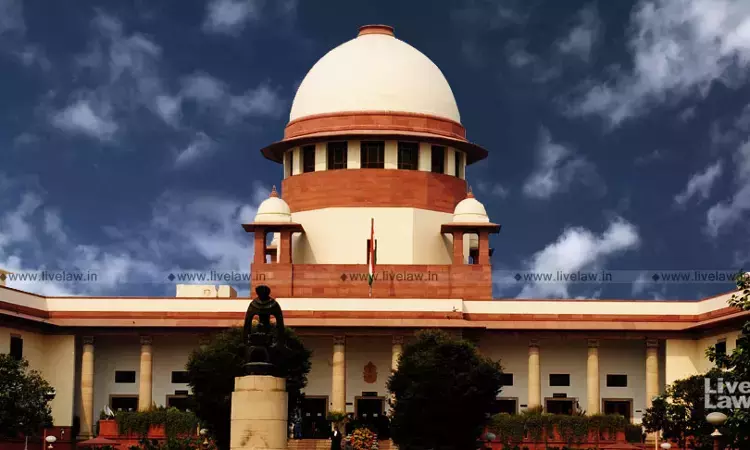Message In A Bottle
Vibha Datta Makhija, Senior Advocate
27 Jan 2024 4:34 PM IST

Though the sun was very bleak on late afternoon of January 19th, 2024, but it shone extremely bright in the Supreme Court of India, when the Full Court conferred the honour of Senior Advocates on 56 lawyers, 11 of them being women. Designations in the Supreme Court are usually internal ongoings of the court not attracting much interest, but this time they have been keenly observed by the media and public. Designations usually happen almost every year, or even a couple of times in a year. The process for this batch of applicants had many hiccups and it took 5 years for the Full Court meeting to happen. But when it did happen, it came with a strong messaging.
The Supreme Court is an apex democratic institution, and its happenings has an indelible impact on the nation's attitudes. The most obvious message of 19th January is the recognition of women as individual professionals in their own right. Besides that, I decipher two more messages which have been sent out firmly, and which I feel is the inevitable future of all political and social systems.
The first, inclusiveness is here only to grow, and the second, all systems will be forced to rework themselves to shed nepotism. Because this change is very slow, it is hardly perceptible. Some will still argue that our systems are fraught with nepotism and favouritism. I don't deny that, but a steady fall in the numbers surely is an indication of the ongoing change. I am not such an optimist to feel that there will never be nepotism and favouritism, but I am an optimist enough to feel that inclusiveness will be the norm, and nepotism the exception.
Every aspect of this year's selection process indicated objectivity and sensitivity. The first telling sign was the inclusion of Ms. Kiran Suri, Senior Advocate, as a member of the Selection Committee. Ms. Suri, a seasoned Senior Advocate (designated in 2013) is a non-flamboyant serious professional practising in the Supreme Court since 1988. Undaunted by her serious personal adversities, she tenaciously went about her work without seeking media or public approval. Her familiarity with the practice of the court and all candidates is unquestionable. The choice of the judges to have her on the committee clearly signalled non-favouritism.
Usually, interviews are hugely unsatisfactory for candidates. But accounts from many of the 199 candidates facing the interview panel consisting of the Hon'ble Chief Justice Dr. DY Chandrachud, Justice Sanjeev Khanna, Justice BR Gavai, Attorney General Mr. Venkataramani, and Ms. Kiran Suri, were in unison on the patience and involvement of the panel members. Interviews were untiringly conducted from 3pm to 9:30pm in 4 batches, and 3 persons were interviewed online because of their request. Even the members of the last batch vouched for the level of interest of the panel. The fact that the Full Court, which deliberated on the final selection, stood strongly by the ethos of the panel, is reflective of the evolving thought process of the Supreme Court judges.
Finally, when the list of 56 names was released by the Full Court, it sent out a cheer. The old guard however, frowned at the number of designations and expressed doubts about the candidate's “ability, standing at the Bar or special knowledge or experience in law” [Section 16(2) of the Advocates Act, 1961].
When one takes a deeper look, one sees many layers. One sees that persons have not been excluded on old biases like age, gender, counsel practice etc. The list boasts of age, gender, regional and community diversity. The Full Court has not been ageist at all and there are some lawyers who are less that 45 years old, an old norm for designation, some who may be well in their late 50's.
An even more significant change, the benchmark of which was set in the year 2013 when all the 4 designations were of Advocates on Record, is the obliteration of the traditional divide of solicitor and counsel practice of undesignated lawyers. Persons without a support system could not carry out a purely counsel practice despite their acumen. Prior to 2013, most Advocates on Record who contemplated applying for the gown would stop filing under their name and develop a counsel practice to be in the zone of consideration. This is a sheer luxury for lawyers not coming from affluent backgrounds or those who are first generation lawyers. This marks a paradigm shift and an acknowledgement of arguing skills of lawyers from all categories. The virtual barriers of role assumption have been knocked off forever.
Another concern for the traditional mindset is the swelling numbers of designation. The same concern has been expressed with regard to the increased number of Advocates on Record. The privilege held in the hands of few leads to complacency and reduces the availability of choice. The larger numbers, to the contrary, increases competency levels and create level markets for the litigants. This designation clearly marks the respect of the bench for the rapidly improving quality of the bar that it deserves. Persons from diverse backgrounds and hardships who have marshalled means to get access to education and opportunity should be recognised for their endeavour.
The hegemony of a few is a thing of the past. The hopes and aspirations of individuals are at the centre of the stage. The message sent out by the Supreme Court is loud and clear. Its resonance in other fields of polity and society will inevitably be felt and its import cannot be undermined. This message sent out by the Supreme Court into the ocean of the nation only needs to be read and acted upon.
The author is a Senior Advocate at supreme Court . Views are personal.


